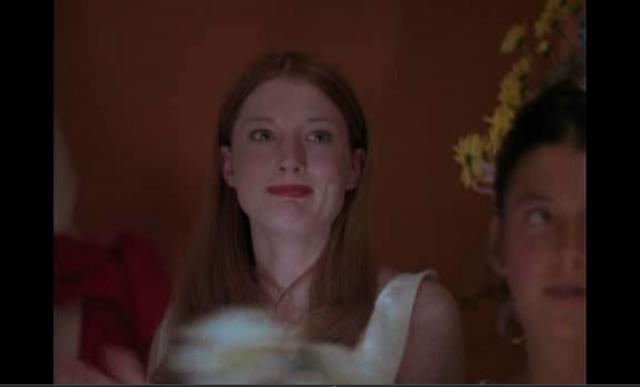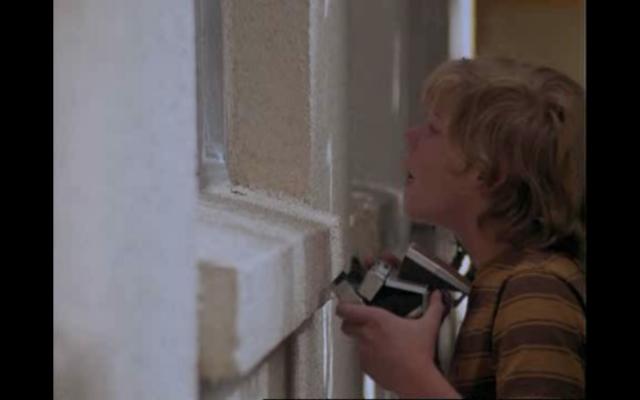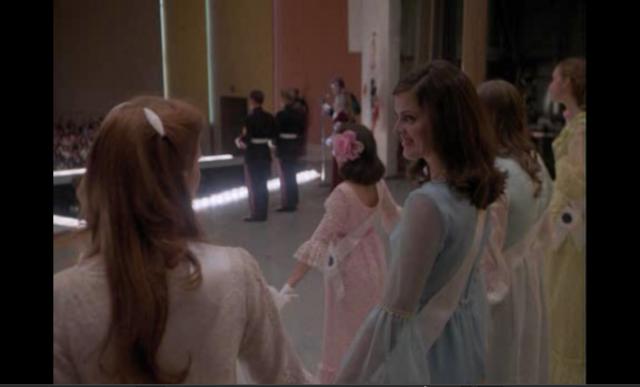|
Genres, Themes, Actors, and Directors:
- Beauty Contests
- Bruce Dern Films
- Michael Ritchie Films
- Satires and Spoofs
- Small Town America
Review:
Smile — directed by Michael Ritchie — is beloved by many critics and fans as the original (and probably the best) “beauty pageant satire”, long before disappointments like 1999’s Drop Dead Gorgeous made it to the big screen. The fact that beauty pageants are “easy pickings” for spoofing makes writer Jerry Belson’s relative success here especially notable: everything about this fictional pageant rings true, from the pride felt by former Young American Miss Barbara Feldon as the contestants’ advice-spinning “den mother” to the sense of “civic duty” possessed by Bruce Dern’s RV-salesman-cum-pageant judge (Dern is fabulous, as always). I especially like the fact that an expected rivalry between the two primary protagonists — seasoned contestant Annette O’Toole (note-perfect in her early role here) and more serious newcomer Robin Gibson — never materializes, and that the outcome of the pageant itself is truly unexpected. The presence of real-life choreographer Michael Kidd as an overpaid but effectual dance director also works surprisingly well. Even some of the more slapsticky elements of the screenplay — i.e., Dern’s pubescent son (Eric Shea) colluding with two buddies to sell nude photographs of the girls — come across as convincing and humorous.
Unfortunately, however, not all elements of Belson’s over-long screenplay work. A subplot involving Feldon’s midlife-crisis-suffering husband (Nicholas Pryor) and his participation (with Dern) in an inane fraternal ritual involving roosters seems completely out of place (especially when his deteriorating relationship with Feldon turns unexpectedly violent), and I’m disturbed by the girls’ rabid, generally accepted hostility towards the only non-White contestant (Maria O’Brien) in the competition. Overall, however, Smile remains an enjoyable time capsule comedy, one which possesses some enduring insights into the world of competitive pageantry.
Redeeming Qualities and Moments:
- Bruce Dern as “Big Bob”

- Annette O’Toole as “Miss Anaheim”

- “Little Bob”‘s naughty escapades

- Jerry Belson’s often clever screenplay

Must See?
Yes, as an enjoyable satire. Listed as a Personal Recommendation in the back of Peary’s book.
Categories
Links:
|
One thought on “Smile (1975)”
A definite must – a neglected, modern American classic.
What a treat to be able to revisit ‘Smile’! I hadn’t seen it in many years but, as noted, that hasn’t been easy to do so.
This is now a 40+-year-old film – yet, it remains fresh; what it has to say about America it’s still saying about America. Frankly speaking, beauty pageants make me want to vomit. Why? Because they are rooted in a false ideal. They are based on a standard that nobody can live up to completely. Those behind them conduct them much like presidential elections. Why? Because a high-enough percentage of the American public wants to adore a phony ideal.
Early on, Feldon makes sure to tell the wanna-bes that there are two basic musts for the pageant: be yourself…and smile! But few things depress me more than watching this much smiling going on for two hours. Luckily, the film is more interested in bite.
I can’t really find fault with ‘Smile’ anywhere. The frat-boy, chicken sequence – to me – lays out what guys in this town are really like (the sub-colony that never grew up). Along that line, the marriage troubles of Pryor and Feldon are purposely left murky (in terms of who is ‘at fault’), so it all comes off as one of those combos that may have started off well but was a victim of bad communication. At least, that’s what it more or less seems. Also, I don’t really think the ‘prejudice’ shown toward the Mexican girl is prejudice at all: the girl is annoying and an ass-kisser, no matter what ethnic group she comes from. I don’t think Belson’s screenplay is long; I find it rich (at one point, surprisingly shocking) and on the mark, in terms of the politics of this kind of event. Belson was not a major screenwriter (he mostly worked for tv, although he has some solid film credits); more’s the pity – when I think of the benefit more could have brought to cinema…! His dialogue is priceless (and his one-liners are killer).
Director Ritchie seems to have had a very fertile career in the ’70s, which somehow didn’t translate much beyond that. I find that odd. Maybe he was just unequivocally hooked into that era.
One, of course, has to keep in mind that this is a local, preliminary pageant. Therefore, it’s less surprising that we don’t run into much along the lines of standout ability (in terms of musicians, or what have you). Still, the film is satire so that’s where the emphasis lies. It’s a kind of genius the way the editing shows us just what we need to see to get the effect of the ‘talent’ that’s on display.
What’s most striking is Ritchie’s documentary approach to the proceedings. He went for ‘real’; as a result, we do particularly believe the reaction shots of mostly everybody – they’ve been encouraged to act like normal folk, warts and all. The cast is uniformly excellent – but, tho I admire much of the work as solid (esp. Dern), I have to give special kudos to Kidd and, esp. Feldon – who is nothing short of perfect. (Feldon *is* this woman; nowhere is it more evident than when she is correcting – you never answer with “Pretty good”, but always “Very good”.)
One of the reasons I was glad to revisit this is that Conrad Hall served as DP. Had any number of other DPs taken the job, we might have seen ‘Smile’ in a predominance of color. But one of Hall’s signatures is shooting in available light. So there are many shadows here – many appropriate shadows (as is Hall’s knack to find).
Obviously, I like this movie a lot. It could easily be in the running for top 10 of the ’70s. …Not that I’m holding a pageant. 😉